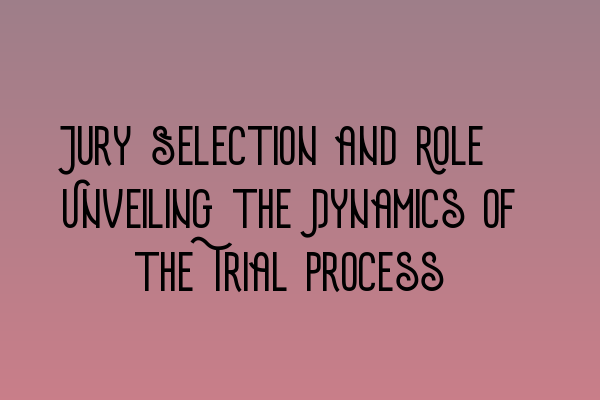Jury Selection and Role: Unveiling the Dynamics of the Trial Process
Welcome to the SQE Criminal Law & Practice Law UK blog, where we delve into the intricacies of the legal system. In today’s post, we will be exploring the fascinating topic of jury selection and their crucial role in the trial process.
When it comes to criminal trials, the jury plays a pivotal role in delivering justice. They are responsible for impartially evaluating the evidence presented and reaching a verdict based on the facts and the law. The selection of the jury is a meticulous process that ensures a fair and unbiased trial.
The Role of the Jury
The jury serves as the fact-finder in a criminal trial. They listen to the arguments presented by the prosecution and the defense, examine the evidence, and ultimately determine the guilt or innocence of the accused. Their role is crucial in upholding the principle of “innocent until proven guilty” and ensuring a fair trial.
To fulfill their duty effectively, jurors must possess certain qualities. They must be impartial, open-minded, and able to set aside any biases or prejudices. Their primary responsibility is to apply the law as instructed by the judge and to weigh the evidence without prejudice.
The Jury Selection Process
The process of selecting a jury is known as voir dire, derived from the French phrase meaning “to speak the truth.” During voir dire, potential jurors are questioned by the prosecution and defense attorneys to assess their impartiality and suitability for the case at hand.
Both the prosecution and defense have the opportunity to challenge potential jurors. This can be done through challenges for cause, which are based on specific reasons indicating bias or an inability to be fair and impartial. Additionally, each side has a limited number of peremptory challenges, which allow them to exclude potential jurors without providing a specific reason.
The goal of the jury selection process is to ensure a fair trial by identifying and eliminating any jurors who may have biases or prejudices that could influence their decision-making process. This process helps to create a diverse and impartial jury that represents a cross-section of the community.
Related Articles:
- SQE 1 Practice Exam Questions
- SQE 1 Practice Mocks FLK1 FLK2
- SQE 2 Preparation Courses
- SQE 1 Preparation Courses
- SRA SQE Exam Dates
Conclusion
Jury selection is a critical step in the trial process. It ensures that the jurors chosen are fair, unbiased, and capable of delivering a just decision. By understanding the dynamics of jury selection and their role, we gain insight into the foundation of a fair trial.
If you are preparing for your upcoming SQE exams or looking for practice exam questions and preparation courses, be sure to check out our related articles linked above. They will provide valuable resources to enhance your understanding and improve your chances of success.
Thank you for joining us on this exploration of jury selection and their vital role in the trial process. Stay tuned for more informative content from SQE Criminal Law & Practice Law UK!
